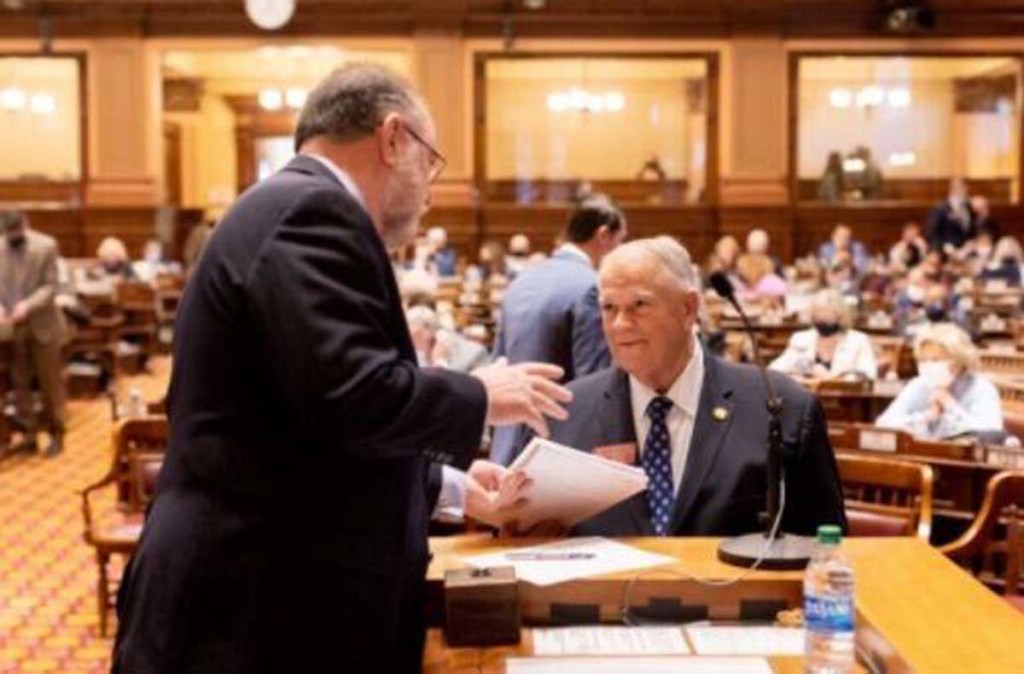Mental health reform bills near governor’s signature
Published 5:51 pm Wednesday, March 30, 2022

- Georgia Speaker David Ralston, right, filing House Bill 1013 on the floor of the House of Representatives with Clerk of the House Bill Reilly, at left, early in the legislative session.Photo from Georgia House of Representatives
ATLANTA — With the legislative session nearing an end, statewide mental health reforms are moving closer to the governor’s desk.
House Speaker David Ralston’s “Mental Health Parity Act” was approved unanimously in the Senate Wednesday after a series of hearings and amendments to the bill during the last month.
Trending
“We’ve heard from strangers that were willing to stand before us and share their personal stories about how mental health and addictive disease had changed their lives and the lives of their family members, and we commend you for stepping up to allow your situation to be used to prevent more folks from going through what you had to face,” said Sen. Brian Strickland before the vote.
Highlights of the bill include:
- Enforcing parity laws, requiring insurers to treat mental health and substance abuse coverage the same as physical health; provisions that Department of Insurance enforce the law by obtaining data from agencies.
- Establishing loan forgiveness programs for those in mental health professions.
- Expanding outpatient programs and addresses involuntary commitment.
- Providing an alternative to jail for an officer to detain someone believed to be suffering from a mental illness.
- Establishing a grant program to help fund local accountability courts to serve mental health and substance abuse populations.
- Providing training for peace officers for the state’s proposed behavioral health co-responder.
- Medicaid coverage for mental health services.
House Bill 1013 incorporates recommendations of the Georgia Behavioral Health Reform & Innovation Commission which was established in 2019 to address rising suicides and mental health issues in the state.
Mental Health America of Georgia — an arm of a nationwide mental health advocacy group — reports that Georgia ranks 48 out of the 50 states and D.C. for access to mental health care, resources and insurance.
“Only 39% of Georgians with mental health issues have access to the treatment they need. We can and must do better,” Democrat Sen. Michell Au said.
HB 1013 went back to the House late Wednesday to approve amendments made by the Senate to the original House bill. The House gave its final approval unanimously. The bill does not specify where funding will come from for the various initiatives in the bill.
Trending
“I’ll acknowledge that House Bill 1013 doesn’t solve our mental health crisis,” Strickland said. “Many parts of this bill are long-term investments that require much more work in the years to come. But together with the passage of House Bill 1013, we’ll start the process of making Georgia not only the best state in the country for business but the best state in the country for mental health services.”
In line with mental health reform in the state, the House approved Senate Bill 403, which is essentially supported in the Mental Health Parity Act by creating a mental health co-responder model for peace officers and behavioral health professionals.
Under the proposal, local community service boards would provide a behavioral health specialist to assist officers responding to a crisis either virtually or in person. With guidance from a licensed counselor, officers will have the authority to refer a person to a treatment facility rather than make an arrest.
The bill goes back to the Senate for final approval due to amendments made to the bill.
Both mental health measures received unanimous approval Wednesday.





